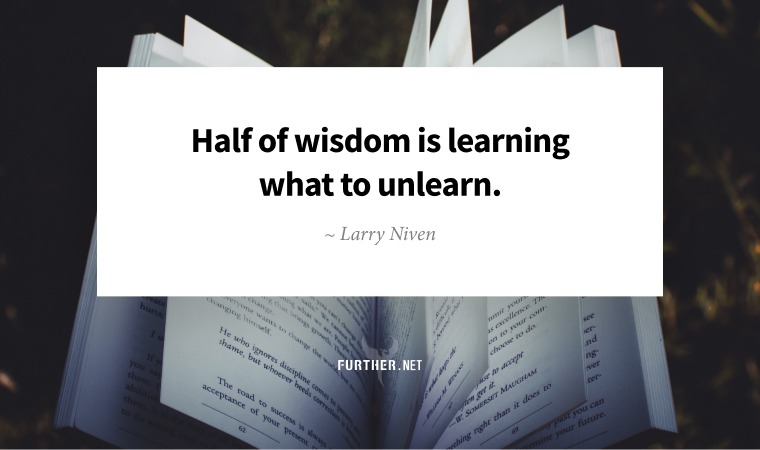
To experience meaningful change, it feels like we must add something to ourselves. New skills to be learned and new challenges accepted to build on who we are.
As we’ve discussed before in the context of modern knowledge work, often you have to unlearn to truly make progress. We know we’re in for lifelong learning in order to survive and thrive in a rapidly evolving business environment, but it’s not just about learning new things.
It’s also about unlearning our old ways that we’ll be tempted to cling to. And this is especially true when we’re seeking personal change.
In the context of personal growth, “unlearning is the process through which we break down the origins of our thoughts, attitudes, behaviors, feelings, and biases.”
It’s asking ourselves:
- Where do these beliefs come from?
- Do these support my mental health?
- Is this in alignment with the life I want?
- Is this congruent with my authenticity and the person I am? The person I want to become?
- Do I believe this to be true to myself?
Naturally, your personal unlearning process also aids in your professional adaptive skills. It’s all about transcending any aspect of ourselves that’s “fixed” in an unhelpful way, which allows for new ideas and innovation.
When you embrace the unlearning process, you open up to new possibilities across the board. You’ll experience greater creativity, discover new perspectives that aid in problem solving, develop a more robust growth mindset by leaving fixed aspects behind, become a more authentic version of yourself, and cultivate an expanded curiosity about the rapidly-changing world around you.
You’ll also begin to heal from the wounds you’ve carried with you over time. Unlearning is a critical aspect of our ability to change, and to become a healthier you for the journey ahead.
The Power of Unlearning (Psychology Today)
Don’t Ask Me, I Don’t Know
We instinctively dislike uncertainty, and that can lead to procrastination, overwhelm, distraction, and anxiety. Truth is, we’d be bored to death without uncertainty, and it’s where we learn and create new things and relationships.
Delight in Uncertainty (Zen Habits)
Self, Actually
Personal growth is considered to be a crucial precursor to well-being, which leads us to focus on actualizing our potential and extending our abilities to serve others. Self-actualization is a peak experience that we should absolutely strive for, while realizing it’s also a lifelong pursuit.
4 Science-Based Tips to Achieve Self-Actualization (Psychology Today)
Stress (Now Reduced!)
“You’ll always have bills to pay, a job to keep, and the occasional emergency expense to deal with. What really matters is how you cope with that stress. With a little forethought and a lot of soul searching, even the most anxious consumer can start to gain a sense of control over their financial — and mental — health.”
How to Manage Financial Stress (Mint)
Retire Your Misconceptions
Research indicates that a 55-year-old and even a 65-year-old have more innovation potential than a 25-year-old. Here’s a snapshot of 25 entrepreneurs who started their businesses after the age of 50.
These 50+ Year Old Entrepreneurs Will Make You Rethink Your Retirement Plan (Arkenea)
Down below, why not emerge from the pandemic as a whole new you? And in the Flashback, a band in Seattle plays a new song live for the very first time. The crowd didn’t know the words (and apparently neither did Kurt), but the world changed.
Keep going-
P.S. Share this issue of Further with friends, and earn cool Further gear. It’s easy … just use these links that contain your unique referral code:
Twitter | Facebook | LinkedIn | WhatsApp | Email
Be Who You Want to Be Post-Pandemic

By Trudi Roth
You’ve heard the old expression, “people don’t change.”
But if you really believed that, you wouldn’t be reading a personal growth newsletter. Good for you, because you’ve nailed one of the five traits that make up personality — openness to experiences.
The rest include conscientiousness, extroversion, agreeableness, and neuroticism. The acronym psychology’s trait theory uses for these five factors, “OCEAN,” points to the idea that your personality isn’t set in stone — it’s more like a sand dune, according to author Olga Khazan.
Scientists say that people can change their personalities well into adulthood. And what better time for transformation than now, when no one has seen you for a year, and might have forgotten what you were like in the first place?
With a new, post-pandemic beachhead ahead of you, you can dive into becoming who you want to be. What would that look like for you?
A Guaranteed Personality?
For centuries, scientists from Hippocrates to Freud promoted the belief that personality is immutable. Today science shows personality change is achievable. For example, a recent study found that people who used an app daily to meet goals, such as being more conscientious or extroverted, maintained those shifts for three months.
While there’s validity to the age-old “nature vs. nurture” debate of personality formation — both factor in — it’s those “in-between” qualities that psychologist Carol Dweck says can be modified. Change your beliefs, habits, and coping mechanisms, and you open the door to a fresh way of being in the world.
And, relatedly, a new version of you.
Change Your Self
Shifting your personality may seem easier said than done, but there is a simple way to get started. By acting “as if” you were a certain way for just a few weeks, you may find that is you. For example, if you want to be more extroverted, start by saying hello to everyone you see.
Other research shows that simply by writing down what you want to change, you pave a pathway to actualizing new behaviors, like being on time (conscientiousness) or socializing (extroversion, decreased neuroticism).
Keep in mind that making changes to, say, become more emotionally stable can be challenging. Whether you’re learning new habits or working on embracing a growth mindset, self-care is essential. A therapist might help, along with other anxiety-relieving techniques.
This is something I know works. I started seeing a psychologist and picked up meditation to decrease my neuroticism during a pivotal transition (the proverbial empty nest).
Not long after, my husband told me, with a smile on his face, “You’re different.” When I probed how so, he thought for a minute and then said, “Nicer.”
That’s the beauty of personality change. Personal growth is an individual choice, but everyone benefits when you decide to become a better version of yourself.
You Can Be a Different Person After the Pandemic (New York Times)
further: flashback

Smells Like Teen Spirit (live for the very first time)
Nevermind, 1991
You take a trip to Seattle to see the town’s biggest grunge act, but the Alice in Chains show is sold out. So you wander into a small club and recognize the name of a band you vaguely know from college radio. About 45 minutes in, the trio plays a new song from their upcoming second album for the first time. It’s called Smells Like Teen Spirit. Companion reading: The Night Nirvana Changed Everything. (YouTube)
further: sharing
Would you do me a favor and share Further with a friend? If so, you can earn cool Further gear when people subscribe thanks to your share.

Simply use these links that contain your unique referral code:
Twitter | Facebook | LinkedIn | WhatsApp | Email
You can also share wherever you like by copying and pasting your unique referral link:
{{subscriber.rh_reflink}}
Thank you for sharing Further!
